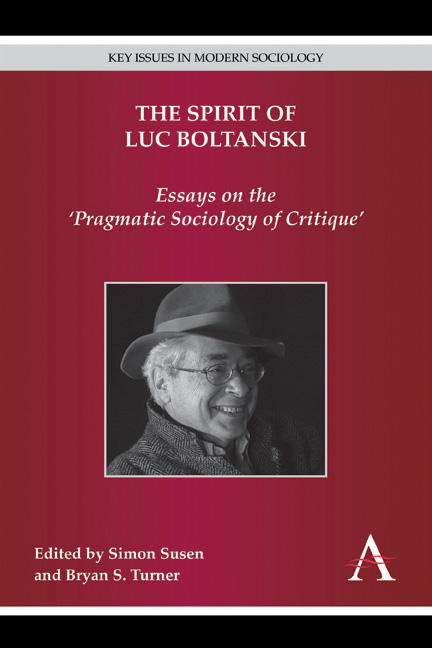Book contents
- Frontmatter
- CONTENTS
- List of Contributors
- Preface
- Part I Introductory Remarks
- Part II Luc Boltanski and (Post-) Classical Sociology
- Part III Luc Boltanski and Pragmatism
- Part IV Luc Boltanski and Critique
- Part V Luc Boltanski and Critical Sociology
- Part VI Luc Boltanski and Political Sociology
- 12 The Promise of Pragmatic Sociology, Human Rights, and the State
- 13 ‘The Political’ in the ‘Pragmatic Sociology of Critique’: Reading Boltanski with Lefort and Castoriadis
- 14 Axel Honneth and Luc Boltanski at the Epicentre of Politics
- 15 The Civil Sphere and On Justification: Two Models of Public Culture
- 16 Luc Boltanski in Euroland
- 17 Reflections on the Indignation of the Disprivileged and the Underprivileged
- Part VII Luc Boltanski and Contemporary Issues
- Part VIII Luc Boltanski in Conversation
- Part IX Luc Boltanski and His Critics
- Index of Names
- Index of Subjects
16 - Luc Boltanski in Euroland
from Part VI - Luc Boltanski and Political Sociology
Published online by Cambridge University Press: 05 December 2014
- Frontmatter
- CONTENTS
- List of Contributors
- Preface
- Part I Introductory Remarks
- Part II Luc Boltanski and (Post-) Classical Sociology
- Part III Luc Boltanski and Pragmatism
- Part IV Luc Boltanski and Critique
- Part V Luc Boltanski and Critical Sociology
- Part VI Luc Boltanski and Political Sociology
- 12 The Promise of Pragmatic Sociology, Human Rights, and the State
- 13 ‘The Political’ in the ‘Pragmatic Sociology of Critique’: Reading Boltanski with Lefort and Castoriadis
- 14 Axel Honneth and Luc Boltanski at the Epicentre of Politics
- 15 The Civil Sphere and On Justification: Two Models of Public Culture
- 16 Luc Boltanski in Euroland
- 17 Reflections on the Indignation of the Disprivileged and the Underprivileged
- Part VII Luc Boltanski and Contemporary Issues
- Part VIII Luc Boltanski in Conversation
- Part IX Luc Boltanski and His Critics
- Index of Names
- Index of Subjects
Summary
Introduction
This chapter relates some of Luc Boltanski's theoretical reflections to the study of the European Union, focusing on its endeavours to create a European-level approach to policy areas hitherto the ‘competence’ of member states. The chapter discusses problematic implications of European integration, such as the notion that some form of European state may emerge or that the ‘ever-closer union’ – one of the EU's ambitions – implies the creation of European citizenship and parallel forms of identity and class allegiances to those found in traditional nation-states. Our hope is that sociologists might be incited to examine power, class interests, and the justification for hidden interests lurking behind the EU's symbols of power and supranational statehood. We seek to analyse how institutional locations (national or supranational), personnel backgrounds, and decision-making methods (the intergovernmental, community method or the open method of coordination) impinge on or determine the prevalence of what Boltanski calls regimes of justification. The chapter begins by situating Boltanski's contribution within a context of four broad families of critical social theory. We then outline several pertinent conceptual EU issues to illustrate the salience of Boltanski's methodological reflections for practical institutional and sociological analysis.
Luc Boltanski and Critical Theory
A critical social theory of contemporary Europe and ‘Europeanization’ (Olsen, 2002) can draw on at least four broad intellectual traditions.
The first is ‘Frankfurt’ critical theory, substantially rooted in Germany but increasingly European in its focus and transatlantic in its protagonists. US-based scholars (though often with a European background) such as Andrew Arato, Seyla Benhabib, James Bohman, Jean Cohen, Nancy Fraser, William Rehg, and others have intervened to shape debates on post-communist constitutionalization, the future of the European Union, and issues of social citizenship in Europe, as have Axel Honneth, Claus Offe, Hauke Brunkhorst, Ulrich Beck and Edgar Grande, and others in Europe. The fact that Jürgen Habermas has also engaged so fully with these issues undoubtedly contributed to the development of a stream of critical theory in various deltas of applied social research and theory, not least ‘European studies’.
- Type
- Chapter
- Information
- The Spirit of Luc BoltanskiEssays on the 'Pragmatic Sociology of Critique', pp. 425 - 444Publisher: Anthem PressPrint publication year: 2014

